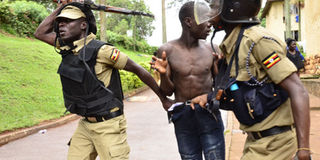Police torture: West Nile victims narrate ordeal

Policemen manhandle a Makerere University student during a protest in May 2017. Several human rights reports have singled out the police as the leading violator of human rights. PHOTO BY ALEX ESAGALA
What you need to know:
- Another man, Mr Norbert Kotura, a teacher was also arrested and detained by the police for one week in Moyo
- In one of the cases, Mr Samuel Jasua, who was disabled after police tortured him in Paidha Town Council in 2012, was awarded Shs25 million
WEST NILE- February 5, 2015 remains a dark day in the life of 57-year-old Yusuf Badru, who was detained at Aliba police cells alongside four others for two weeks without trial.
The others are Mr Amid Noor, Mr Badru Yassin, Mr Noor Hassan and Mr Aziz Swaleh.
The five suffered psychological torture, which Badru says still haunts him to date as he recounts the harsh conditions they were subjected to while in Aliba Sub-county, Moyo District.
“The police just came and rounded us up after a mob beat up some man and dumped the body near our home at night. We spent two weeks in police cells without any trial. The cell was not hospitable to human beings. It looked more like a dog kennel,” he said.
He added: “Sometimes you felt you would suffocate because there where no proper ventilators. I always asked why police behave unprofessionally by detaining people for more than 48 hours when they are aware it is unconstitutional.”
After spending two weeks in police cells, they were released on bond by police following concerted pressure by their relatives.
Badru says after their release from the cells, they petitioned the Uganda Human Rights Commission (UHRC) for legal redress over the violation of their rights and humiliation they faced while in the police cells.
UHRC awarded them Shs12 million as compensation for violation of their personal liberty.
Out of the Shs12 million, each is to receive Shs3 million.
Police have on several occasions been accused of torturing civilians.
Asked whether he was satisfied with the compensation, Badru said: “God said you appreciate the little you have received. So I thank God for keeping me alive and hopefully God will add more. But our policemen should act professionally to civilians and desist from detaining people beyond 48 hours on grounds that investigations are incomplete.”
Another man, Mr Norbert Kotura, a teacher was also arrested and detained by the police for one week in Moyo.
“My relatives wanted me released on police bond but police refused until one week later. My crime was that I cut down trees that my mother had planted. So my uncle took me to police where I was detained for a week in 2014,” Kotura said.
In a recent interview with Daily Monitor, UHRC commissioner Meddie Mulumba cautioned the police on torture.
“I even have cases of people being detained by police for 33 days. It is ridiculous that the police charged with observing the law are taking it into their hands,” he said.
“There is already a draft law where police officers will be held individually liable for their actions. And some of these policemen will have their salaries deducted for compensation and others could lose their jobs,” he added.
Mr Mulumba said there was need for the police to act responsibly and desist from impunity.
In respect to the national laws, Article 23 of the 1995 Constitution provides for the protection of personal liberty while Article 24 of the same provides for the respect for human dignity and protection from inhuman treatment.
Other local legislation includes the Police Act, the Magistrate Court Act, the UPDF Act and the Children’s Act which provides an elaborate framework for detention of juvenile, among others.
However, the acting West Nile region police commander, Mr Peter Muwonge, said: “Once a police officer tortures a suspect, he or she will be liable for their actions. We always ask our officers not to get angrier with suspects or complainants and we urge them to obey the 48 hour rule unless it is warranted in some aggravated criminal activities.”
Rights violations
Various Human Rights Annual Reports have always faulted the police as leading in violations of human rights in Uganda.
The commission on December 12 and 13 awarded Shs80 million to victims of police torture from 15 cases it heard before the tribunal from Arua regional office.
In October, the commission also awarded more than Shs50 million in compensation to four complainants.
In one of the cases, Mr Samuel Jasua, who was disabled after police tortured him in Paidha Town Council in 2012, was awarded Shs25 million.
The commission also awarded Shs30 million to the family of late Fred Odama, who was tortured by police and he died at the police cells in Arua District.




